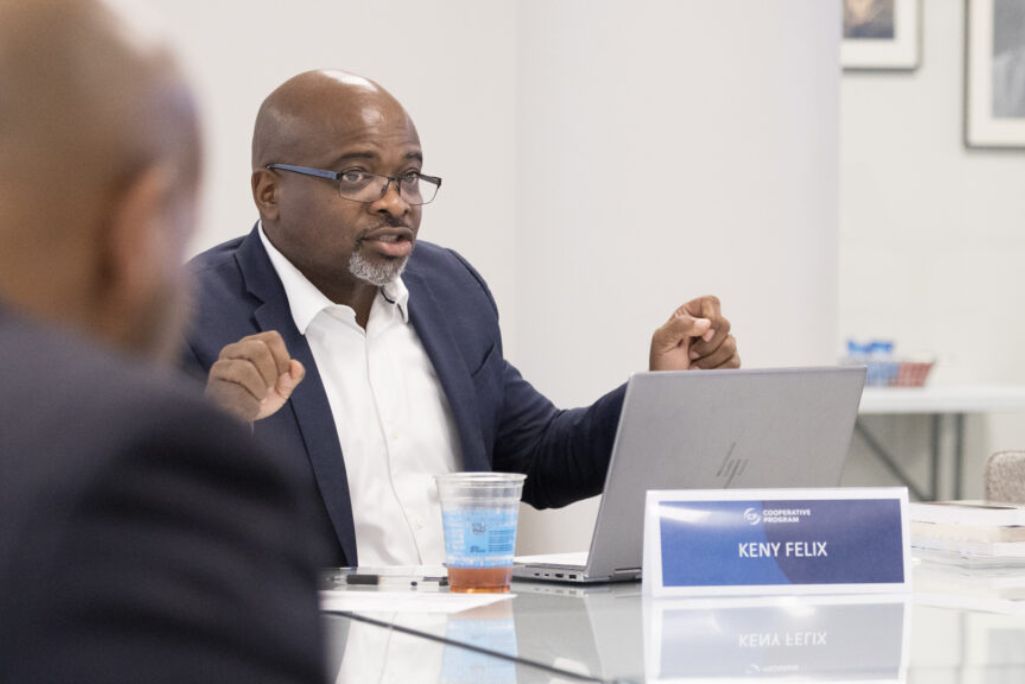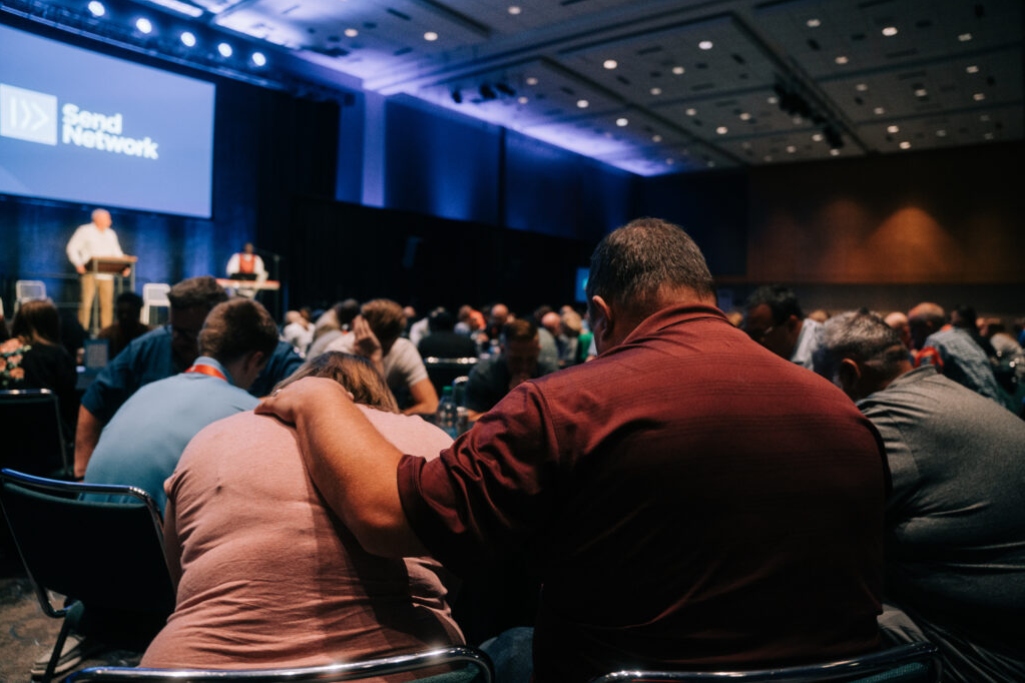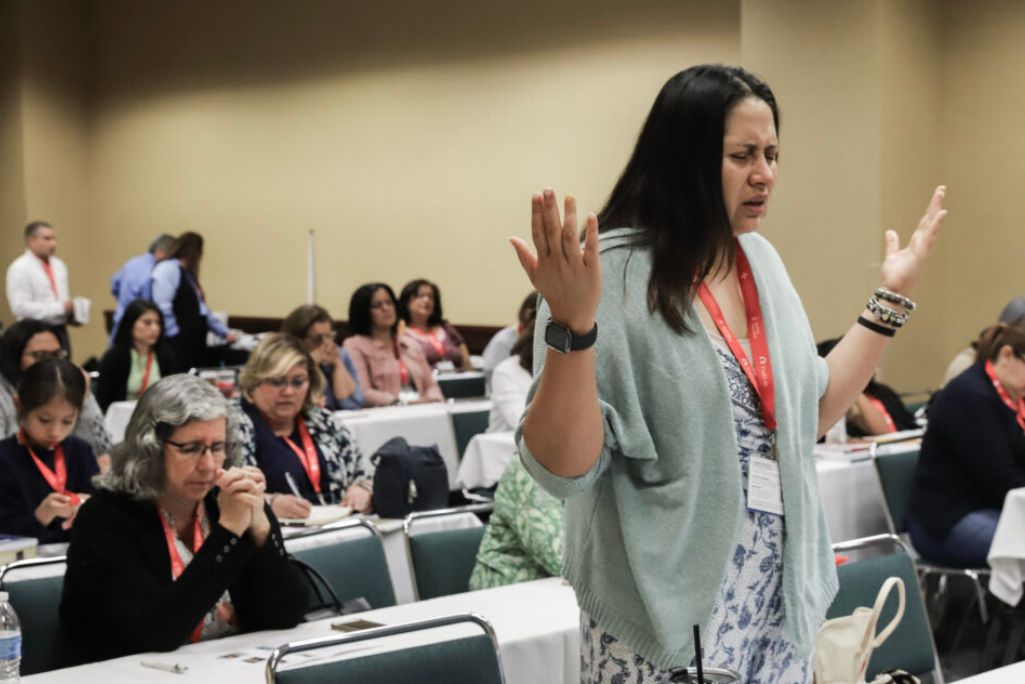
Keny Felix, shown at a September 2023 meeting in Nashville, is actively preparing Haitians in south Florida to navigate rapidly changing immigration rules under the Trump administration.
MIAMI (BP) — They are pastors, deacons and other clergy actively working among the 500 Haitian churches in the Southern Baptist Convention (SBC) — at least for another four weeks.
They are active ministers and members of the 3,500 Hispanic congregations — Nicaraguans, Venezuelans and Cubans — that have united with the SBC.
But they are also among an estimated 534,000 Haitians, Nicaraguans, Venezuelans and Cubans ordered to return to their home countries no later than April 24, the result of the U.S. ending the humanitarian parole program that had granted the individuals safe refuge here while their home countries broil in gang violence, governmental upheaval, poverty, religious persecution and other ills.
John Voltaire, Florida Baptist Convention Haitian multicultural catalyst, tells of a young mother who greeted him at a Haitian congregation in Florida, where 72% of Haitian Southern Baptists live and worship.
“At first, it was the threat of ICE (U.S. Immigration and Customs Enforcement) agents coming to church and trying to arrest people and deport people,” Voltaire said. “But now, I have people contacting me directly, crying, asking, ‘What do we do?’ because (March) 25th is when the 30-day mark starts.”
Many stopped attending churches in January when the sensitive locations limitations were lifted on ICE arrests — impacting churches and schools. But the end of the humanitarian parole program, and the Temporary Protected Status (TPS) program in August, will together inflict a multilayered wound upon churches, families and gospel witness, Haitian and Hispanic leaders told Baptist Press.
“Nobody wants to have criminals running around, but in the process, we have people who are good neighbors, who are members of our churches, deacons and pastors, and we have a lot of clergy also,” Voltaire said. “They came through those programs. Now, they are actively working in our churches.”
Bruno Molina, executive director of the National Hispanic Baptist Network (NHBN), said “very significant” numbers of those ordered to return to their home countries are members of Southern Baptist churches, but he didn’t have specific numbers.
“This is really impacting all SBC churches with immigrant populations,” said Molina, who recently transitioned to a full-time role as executive director of the NHBN. “It’s resulting in a decrease in attendance, giving and personal well being. Churches will experience a decrease in membership, funding and certainly gospel collaboration. We’ll just have to continue to be light and salt and keep on keeping on.”
Some Hispanics impacted by the immigration terminations are active ministers, Molina said.
Generally, they have no choice but to obey the immigration orders, which are perhaps more dangerous than defying the orders and remaining in the U.S. illegally, leaders have told Baptist Press.
“It’s not like when they go back (to their home countries) the governments are waiting for them with open arms, looking to ensure their welfare,” Molina said. “They’re going to return to the turmoil from which they fled, and many of them will suffer imprisonment, political persecution, violence and very difficult to impossible economic conditions. They’ll be seen as pariahs in their own countries, both by the government and by others who may resent the fact that they left.
“It should be noted also that those currently under the Temporary Protected Status are people who’ve been vetted as suffering under extraordinary circumstances,” he said. “They aren’t considered a security threat, and they even have financial sponsors. So it’s not like they’re considered criminals or are a threat to their communities.”
About 864,000 individuals from 16 countries are enrolled in TPS in the U.S., the National Immigration Forum said in a March 14 fact sheet, based on Sept. 23, 2024, numbers. That includes 344,335 Venezuelans, 200,005 Haitians and 180,375 El Salvadorans, as well as about 50,000 who fled the war in Ukraine, more than 8,000 from Afghanistan, and others.
Molina and Keny Felix, president of the Southern Baptist Convention National Haitian Fellowship and a vice president of the Haitian Christian Leaders Coalition, are among advocates for the revival of the Dignity Act, a bipartisan immigration bill its key sponsors say is aimed at stopping illegal immigration, providing a dignified solution for undocumented immigrants, strengthening the workforce and economy, and ensuring U.S. prosperity and competitiveness.
On behalf of NHBN, Molina signed a proposal for congressional immigration reform by the National Hispanic Pastors Alliance that is based on the Dignity Act. Felix, on a trip to Washington on March 2, met with John Mark Kolb, the chief of staff of U.S. Rep. Maria Salazar, R-Fla., chief sponsor of the Dignity Act alongside Veronica Escobar, D-Texas. Salazar, Felix told Baptist Press, planned to reintroduce the act in the coming months.
Felix ranks the immigration emergency as more difficult than the crisis the church endured during the COVID-19 pandemic.
“The pandemic was pervasive, everyone exposed. This one is targeted,” Felix said. “These actions are going after seeming Black and Brown people, to put them back into life conditions that no one would ever want to experience.”
Felix doesn’t see the end of the humanitarian parole program as hinging on protecting the borders, because everyone enrolled in the program came legally. And he doesn’t believe it’s about protecting jobs because of the federal government firings.
“It’s stripping them from the opportunity to live securely, surrounded by friends and loved ones, and being part of church communities,” said Felix, who pastors Bethel Evangelical Baptist Church in south Florida. “This will definitely impact the local church … across ethnicities.”
The first thing many of those enrolled in the parole program did was connect with a local church, Felix said, where they were able to grow in their faith.
“And they began to be active members of our churches,” he said. “And so churches are about to lose a good portion within their membership. But it’s not only losing the people, but it’s also the connections that all these folks had as a result. It’s a loss that is multilevel.”
While the program was temporary, those enrolled had connected with families, schools and jobs, and were beginning new families. Felix questions why the program was ended so abruptly with “complete disregard for the lives of those that will be put at stake of danger in returning to these violent situations in their homelands.”
Leaders point to mercy, care, prayer and love in responding to the crisis as the church.
“I, of course, feel terrible for the people who are suffering under those circumstances,” Molina said, “and I think that one of the things we need to remember as Southern Baptists is we are told to treat others as we would like to be treated. And so, this begs the question, ‘If you were forced to leave the U.S. and flee to a foreign country whose language and country are alien to you to protect yourself and your family from political and religious persecution and violence and possibly economic challenges, how would you like to be treated?’”
Felix prays that the church will not lose what he terms as central to the Christian identity: “God’s love that leads us to be compassionate to others, especially our Southern Baptist brothers and sisters.”
“The church needs to be the church for such a time as this,” Felix said, “to do what is right.”
(EDITOR’S NOTE — Diana Chandler is Baptist Press’ senior writer.)


